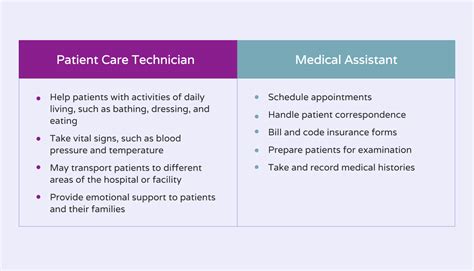As a Patient Care Technician (PCT) PRN, you have the unique opportunity to make a positive impact on patients' lives while working on a flexible, as-needed schedule. However, excelling in this role requires a combination of technical skills, emotional intelligence, and a strong work ethic. In this article, we will explore five ways to excel as a PCT PRN and provide tips on how to succeed in this dynamic and rewarding career.
The Importance of PCT PRNs in Healthcare
Before we dive into the ways to excel as a PCT PRN, it's essential to understand the significance of this role in the healthcare system. Patient Care Technicians play a vital role in supporting nurses and other healthcare professionals by providing basic care to patients, such as bathing, dressing, and feeding. PRN PCTs, in particular, offer flexibility to healthcare facilities, filling gaps in staffing and ensuring that patients receive the care they need.
1. Develop Strong Communication Skills
Effective communication is critical in any healthcare role, and as a PCT PRN, you will interact with patients, families, and healthcare professionals from diverse backgrounds. To excel in this area:
- Practice active listening to understand patients' needs and concerns
- Use clear, concise language to communicate with patients and colleagues
- Be empathetic and understanding, providing emotional support to patients and families
- Maintain accurate and detailed documentation of patient interactions

2. Stay Up-to-Date with Clinical Skills and Knowledge
As a PCT PRN, you will work in various healthcare settings, each with its unique challenges and requirements. To stay current and provide high-quality care:
- Participate in continuing education programs and workshops to enhance your clinical skills
- Stay updated on the latest medical research, technologies, and best practices
- Familiarize yourself with different electronic medical records (EMRs) systems
- Develop your critical thinking skills to respond to unexpected situations
Clinical Skills for PCT PRNs
- Vital signs measurement
- Wound care and dressing
- Mobility and transfer assistance
- Incontinence care
- Medication administration (as permitted by state regulations)
3. Cultivate Emotional Intelligence and Empathy
As a PCT PRN, you will encounter patients and families experiencing stress, anxiety, and uncertainty. To provide exceptional care:
- Practice self-awareness, recognizing your emotions and biases
- Develop empathy by putting yourself in patients' shoes
- Use emotional intelligence to manage conflicts and difficult situations
- Maintain a positive attitude, even in challenging environments

4. Prioritize Patient Safety and Satisfaction
As a PCT PRN, you play a crucial role in ensuring patient safety and satisfaction. To excel in this area:
- Follow hospital policies and procedures to prevent medical errors
- Maintain a clean and safe environment, adhering to infection control guidelines
- Respond promptly to patients' needs and concerns
- Encourage patient engagement and participation in their care
Patient Safety Tips for PCT PRNs
- Use two forms of patient identification before administering care
- Implement fall prevention strategies
- Monitor patients' allergies and sensitivities
- Report any concerns or incidents to the nurse or supervisor
5. Build Strong Relationships with Colleagues and Healthcare Teams
As a PCT PRN, you will work with diverse healthcare professionals, each with their unique roles and responsibilities. To build strong relationships:
- Communicate effectively with colleagues, clarifying expectations and needs
- Offer assistance and support to team members when needed
- Respect and appreciate the contributions of other healthcare professionals
- Participate in team meetings and discussions to stay informed and engaged

Conclusion
As a Patient Care Technician PRN, you have the opportunity to make a meaningful difference in patients' lives while working on a flexible schedule. By developing strong communication skills, staying up-to-date with clinical skills and knowledge, cultivating emotional intelligence and empathy, prioritizing patient safety and satisfaction, and building strong relationships with colleagues and healthcare teams, you can excel in this dynamic and rewarding career.






FAQs
What is the average salary for a PCT PRN?
+The average salary for a PCT PRN varies depending on location, experience, and employer. However, according to the Bureau of Labor Statistics, the median annual salary for nursing assistants, including PCT PRNs, was $30,830 in May 2020.
What are the typical work hours for a PCT PRN?
+PCT PRNs typically work on an as-needed basis, which can include days, evenings, nights, weekends, and holidays. The specific work hours will depend on the healthcare facility's needs and the PCT PRN's availability.
What are the educational requirements for a PCT PRN?
+To become a PCT PRN, you typically need to complete a state-approved training program in patient care technology or a related field. Some employers may also require a certification, such as the Certified Nursing Assistant (CNA) or Certified Patient Care Technician (CPCT) credential.
